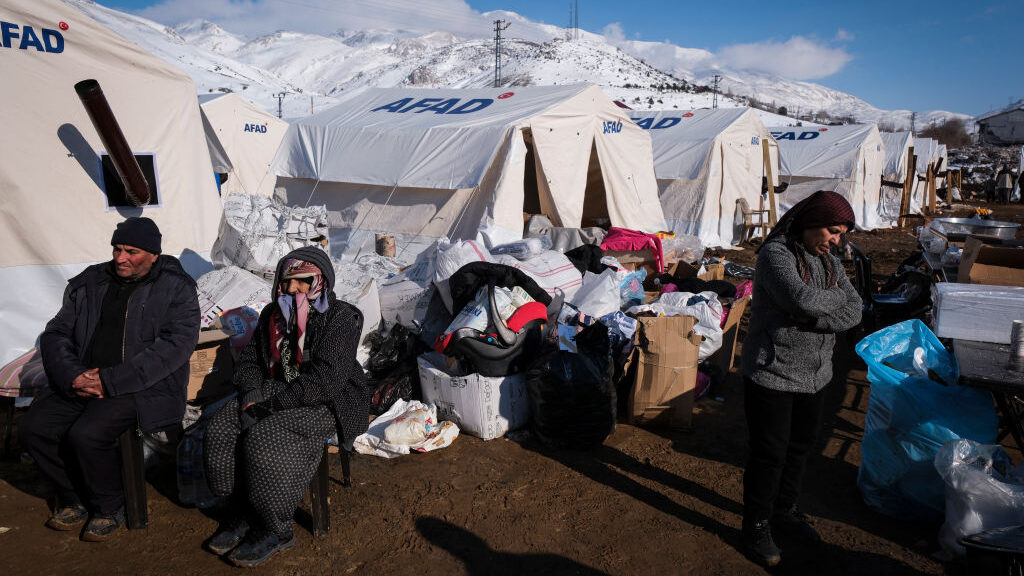Turks Made Homeless by Massive Earthquake Face Uncertain Future
More than 1 million are left without homes or living outdoors due to damage to buildings and fears of collapse amid freezing conditions, and many say they feel forgotten by the Turkish government
Among the dozens of tents pitched under the roof of a food market, 70-year-old Ayse Gul laments her unknown future in Adana, one of the cities in southeast Turkey that was impacted by the 7.8-magnitude earthquake.
Gul said that since the quake she has felt depressed and does not feel safe going indoors.
“We can’t afford to go anywhere else,” Gul said. “We have to stay in Adana.”
Most of the buildings in the immediate area remain standing, although some have obvious cracks in the walls near the foundation, while one is leaning to the side.
Gul says they have enough food and water, but not clothes.
While her building did not collapse, there was damage and the government will not let people stay inside. Gul says engineers need to inspect her building to see if it is safe to return.
We can’t afford to go anywhere else
She says she understood that her city was susceptible to an earthquake and that politicians and local officials should have helped prevent such damage from happening to people’s homes.
“We are really old and we couldn’t do anything,” she said.
Immediately next to the group of tents where Gul is staying is a collapsed building with a large crane and emergency workers standing on top of the rubble.
At a blue tent nearby, volunteers with Turkish organizations and the Red Crescent are offering food, water and tea.
One volunteer says he thinks the people could be staying in the tents for at least two months because the area of the quake and the demand for assistance are both so large.
Others staying in these tents sit around fires, some of the ladies breaking down in tears.
It’s a very similar scene to a refugee camp, except these people went through an earthquake, not a war, and they are surrounded by modern apartment buildings that survived the quake and a city that is still bustling with open shops and people going to work.
More than a million people have been made homeless by the earthquake, with its devastation spanning 10 provinces.
Engineers warned for years that people in the country were vulnerable due to poor construction that had not followed the building codes that would have allowed their homes to withstand an earthquake.
Mustafa, 42, is staying in a tent with about 15 relatives, including his four children, next to the side of a busy road.
Some of his family huddle around a fire in the evening, grilling meat and drinking tea.
At the front of their tent is a table with food and drink, and inside are his children, including a 9-month-old baby.
There is one light bulb and an electric heater, something he says is rare for people staying inside the tents.
He said he is considering leaving the country because he does not know what will happen to his life or his job as a mechanic.
Meanwhile, Mustafa says he has no idea how long they will have to live like this, guessing that it could be one or two months, perhaps more. While he does not want to live in tent, he is too afraid to go back inside his home.
“Even if the government let [me] in the building, I will not go in,” he said.
Mustafa walks across the street to another group of tents in a parking lot. Inside one, he said, the people are cold because they have no heating nor electricity.
An 80-year-old woman sits on a folding chair, wearing a coat with a blanket covering her legs. One of the women living in the tent brings out a gray blanket to show how thin it is.
Mustafa then walks to a nearby school where more people are staying inside a large gym with mattresses on the floor. Despite being inside, people are wearing their coats and sitting under blankets.
Mustafa says there is a cafeteria but complains that people have to pay for tea even though some ran out of their homes with nothing.
He says he feels ignored by the government, as does Gul.
Eventually breaking down in tears, Gul speaks about how lonely she feels and complains that government officials have not come to comfort them, in contrast with the rest of the world.
“People who are from foreign countries came here and are talking with us and helping us,” she said.


